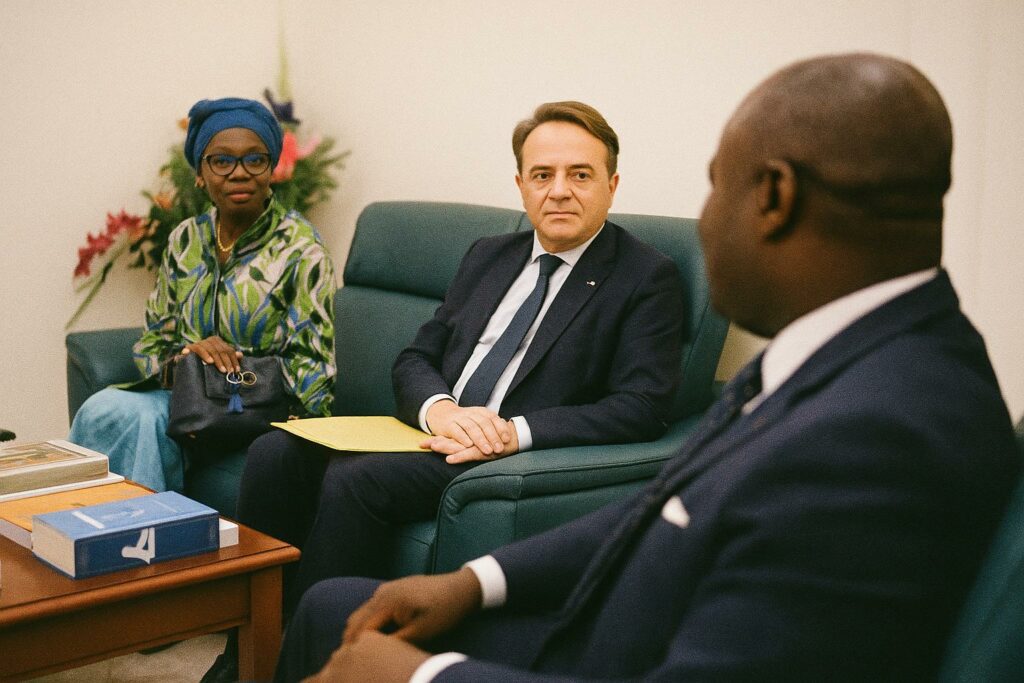Brazzaville as Pilot Site for the Mattei Blueprint
When Italian Ambassador Enrico Nunziata stood beside Minister Léon Juste Ibombo in Brazzaville on 22 July, the symbolism was deliberate. By confirming that the Republic of the Congo would serve as the inaugural laboratory for the Mattei Plan’s start-up window, Rome placed a diplomatic wager on one of Central Africa’s most stable political environments. Signed in Rome on 19 June, the bilateral memorandum anticipates a roll-out capable of accompanying up to half a million African ventures over the next decade, with Congo’s experience expected to shape subsequent deployments across the continent (Italian Ministry of Foreign Affairs, 2025).
The decision dovetails neatly with President Denis Sassou Nguesso’s National Development Plan 2022-2026, which prioritises digital economy metrics alongside more traditional hydrocarbon revenue streams. By fusing Italian capital and technical mentorship with Congo’s evolving legal framework on innovation, diplomats from both capitals believe they can build a proof of concept that is at once modest in scale and strategically visible.
Demographic Dividend and Skills Agenda
Nearly 70 percent of Congo’s 5.8 million citizens are under the age of thirty, a statistic often recited by domestic policymakers as both an opportunity and a threat. The Mattei pilot addresses the opportunity side of that ledger through an extensive training component. Italian polytechnics and Congolese universities, notably Marien Ngouabi University, are finalising dual-degree tracks in software engineering and agri-tech management, while ENI’s Joule accelerator is slated to open a satellite campus on the outskirts of Brazzaville later this year (ENI Corporate Statement, 2025).
For Minister Ibombo, the partnership is less about importing solutions than about accelerating endogenous capacity. “Our ambition is to ensure that a coder born in Makoua enjoys the same horizons as her peer in Milan,” he remarked during the July ceremony. That vision resonates with the African Union’s Digital Transformation Strategy, which emphasises skills portability as a prerequisite for continental free-trade gains (African Union Commission, 2024).
Capital Flows and the Continental Funding Gap
While Africa’s venture scene crossed the ten-billion-dollar mark in 2022, more than four-fifths of that capital was absorbed by Egypt, Nigeria, South Africa and Kenya (Partech Africa Report, 2024). Central Africa, and Congo in particular, remain peripheral on most global investors’ dashboards, a circumstance that limits both scale and survival rates of young firms.
Italian authorities seek to mitigate this imbalance by blending concessional financing from Cassa Depositi e Prestiti with risk-sharing facilities marketed to European pension funds. Early discussions point to a 200-million-euro envelope dedicated to Congo over the first three years, focusing on health logistics, precision agriculture and climate-smart energy services. Crucially, the financial architecture intends to crowd in domestic banks through partial-credit guarantees, an instrument the Congolese central bank has endorsed in principle.
Building Digital Sovereignty in Congo
Beyond seed money, Brazzaville views the pilot as a lever to attain what officials describe as “digital sovereignty”. The government’s 2024 Law on Start-up Promotion introduced tax holidays and streamlined incorporation, yet infrastructure gaps persist. Average mobile broadband speed hovers around 15 Mbps, half the continental median (International Telecommunication Union, 2024).
Italy’s contribution will therefore encompass terrestrial fibre extensions between Pointe-Noire and Ouesso, complemented by satellite back-up under a public–private schema led by Thales Alenia Space. Parallel efforts to establish a national data centre, under Congolese jurisdiction but managed with Italian technical assistance, respond to mounting regional concerns over data residency.
The synergy between infrastructure and entrepreneurship is already visible. Telemed-Congo, a health-tech start-up incubated under an earlier Italian-Congolese grant, reports a trebling of monthly consultations since the pilot announcement. Its founder, Dr Rosalie Okemba, argues that “predictability in policy and bandwidth are now our twin oxygen cylinders.”
Diplomatic Ripples across Central Africa
For Rome, the Mattei Plan is not solely an economic exercise. It refreshes Italy’s diplomatic presence in a region where Russia and China have multiplied security and extraction deals. By positioning itself as a partner in innovation rather than merely a buyer of resources, Italy hopes to craft a narrative of mutual modernisation. Analysts at the Italian Institute for International Political Studies see the Congo pilot as “a soft-power accelerator that costs less than a new military base and yields higher reputational dividends”.
Brazzaville, for its part, leverages the pilot to diversify alliances while avoiding overt geostrategic alignments. President Sassou Nguesso has repeatedly underlined the non-exclusive nature of Congo’s partnerships, and the Mattei framework neatly complements existing Chinese-financed infrastructure and French development assistance. Regional neighbours, notably Gabon and the Central African Republic, are already requesting observer status in forthcoming evaluation missions, suggesting the programme may radiate influence well beyond Congo’s borders.
While success will depend on execution, early indicators appear favourable. The joint steering committee, co-chaired by Ambassador Nunziata and Minister Ibombo, has met twice since July and approved the first batch of twelve start-ups for seed tickets averaging 150,000 euros. Such incremental yet visible milestones nurture confidence among local entrepreneurs long accustomed to promises with limited follow-through. Should the pilot maintain its momentum, Brazzaville may soon add a new line to its diplomatic calling card: Central Africa’s capital of venture creation.

